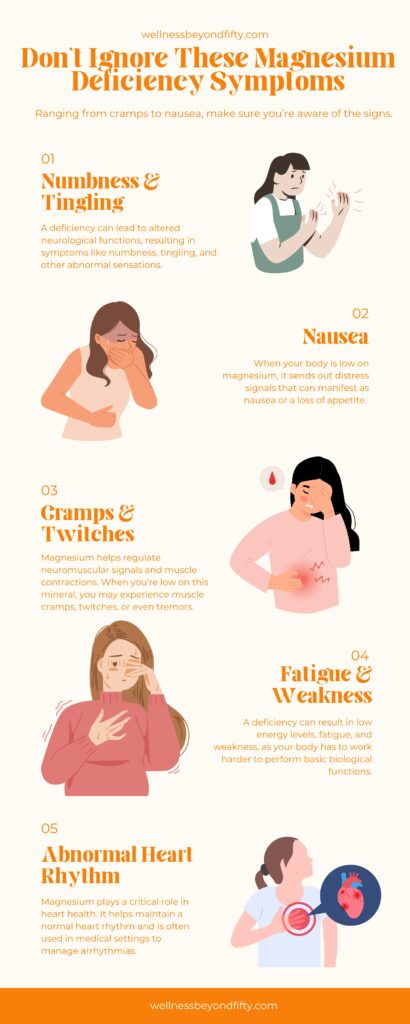Introduction: The Unsung Hero of Minerals
Magnesium is like the utility player on a baseball team—versatile, essential, but often overlooked. As a registered dietitian, I can’t stress enough how crucial this mineral is for a multitude of bodily functions. From supporting your nervous system to aiding in the production of energy, magnesium is a powerhouse. Yet, many people are unaware they’re deficient in this essential nutrient. Today, let’s delve into the five telltale symptoms of magnesium deficiency that you should never overlook.

Why Magnesium Matters: A Quick Overview
Magnesium is a jack-of-all-trades in the world of minerals. It’s involved in everything from DNA synthesis and energy production to nerve function and blood pressure regulation. It even plays a role in the structural development of bone. Suffice to say, you don’t want to skimp on magnesium if you’re interested in optimal health.

Symptom #1: Muscle Cramps and Twitches
If you’ve ever been jolted awake by a sudden leg cramp, you know how painful muscle spasms can be. While these cramps can be caused by a variety of factors, a lack of magnesium is a common culprit. Magnesium helps regulate neuromuscular signals and muscle contractions. When you’re low on this mineral, you may experience muscle cramps, twitches, or even tremors.

Symptom #2: Fatigue and Weakness
Feeling tired all the time? Before you jump to more severe conclusions, consider your magnesium levels. Magnesium is essential for converting food into energy. A deficiency can result in low energy levels, fatigue, and weakness, as your body has to work harder to perform basic biological functions.

Symptom #3: Nausea and Loss of Appetite
When your body is low on magnesium, it sends out distress signals that can manifest as nausea or a loss of appetite. While these symptoms are non-specific and can be attributed to various conditions, a persistent lack of interest in food might be your body’s way of telling you it’s missing something essential.

Symptom #4: Abnormal Heart Rhythms
Magnesium plays a critical role in heart health. It helps maintain a normal heart rhythm and is often used in medical settings to manage arrhythmias. If you’re experiencing palpitations or irregular heartbeats, a magnesium deficiency could be to blame.

Symptom #5: Numbness and Tingling
Magnesium is crucial for nerve function. A deficiency can lead to altered neurological functions, resulting in symptoms like numbness, tingling, and other abnormal sensations. These symptoms are your nervous system’s way of sounding the alarm that something is off balance.

Don’t Ignore the Signs: Get Tested
If you’re experiencing one or more of these symptoms, it’s essential to consult with a healthcare provider for proper diagnosis and treatment. A simple blood test can determine your magnesium levels and rule out other potential causes for your symptoms.
Amazon Recommendations: Boost Your Magnesium Levels
If you’re looking to up your magnesium intake, here are some top-rated supplements and foods rich in magnesium that you can easily find on Amazon:
1. Natural Vitality Calm Magnesium Powder
This magnesium supplement is highly absorbable and easy on the stomach. It’s a great option for those who prefer not to take pills.
2. Doctor’s Best High Absorption Magnesium
These magnesium tablets are made from a chelated form of magnesium, making them easier to absorb and utilize in the body.
3. Terrasoul Superfoods Organic Pumpkin Seeds
If you prefer to get your nutrients from whole foods, pumpkin seeds are an excellent source of magnesium. Terrasoul’s organic pumpkin seeds are both delicious and nutritious.
4. Blue Diamond Almonds
Almonds are another fantastic source of magnesium. Snack on a handful, or use them in recipes to boost your magnesium intake naturally.
Conclusion: Listen to Your Body
Magnesium deficiency is more common than you might think, and its symptoms can significantly impact your quality of life. If you’re experiencing any of the symptoms mentioned above, don’t ignore them. Consult a healthcare provider for proper diagnosis and treatment. And remember, whether it’s through diet or supplements, boosting your magnesium levels can make a world of difference in how you feel each day.
Disclaimer: This article is for informational purposes only and should not be considered medical advice. Always consult with a healthcare provider for medical advice and treatment.




























